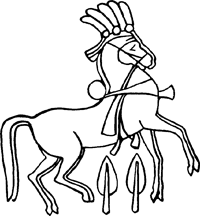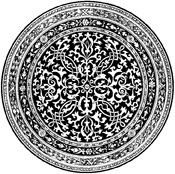
Q: Who are the "warlords"? Okay this isn't really a question, as I am sure they are the three nations of horse nomads that kick the game off. Still, it is not made explicit, and I think it needs to be because it has an impact on the scoring.
 A: The Warlords are: the Hirenmador, The Hyalorings, and the Veshtargos. You are absolutely correct.
A: The Warlords are: the Hirenmador, The Hyalorings, and the Veshtargos. You are absolutely correct.
Note on "historical" accuracy: - it is my opinion that there were all sorts of nomad bands riding around Peloria at the dawn terrorizing people and lording it over peasants. The division into three groups is really a concession to the 4 player nature of the game although the Hyalorings are a definite group of Horse riders originating in Saird, and the Hirenmador (aka Chariot Lords) represent a Chariot riding group. The Veshtargos probably represent a Deshkorgos propitiating band of cannibals with a bad reputation, although that might be what anyone thinks of an enemy horse riding group.
Q: When do you score for being emperor? It says you could do this during each nation's turn. If so and have the possibility of multiple emperors in one era. If so does the current emperor still need to add another piece of regalia to score in the following era? Also when in a turn does this happen? This might not seem important, but in one game the Pentlanders managed to grab Vonlath and an extra piece of regalia, at the same time as being cut off from their homeland. Do they claim the throne for Pentland and then defect, or defect and hand the throne to Peloria?
A: You can claim to be Emperor on your Nation's turn, but you only score if you are Emperor at the end of the Round.
The Emperor scoring, Shah of Carmania Scoring and Nation Scoring all occur at the end of the Round - so in Round 1 we have the Hirenmador turn, then the Hyalorings, Veshtargos, Alkoth, Pelandans, Pelorians, Theyalans turns and then see who is the Emperor, and which areas/number of units are possessed (for Nation Scoring).
A Nation can claim to be the Imperial Nation (and thus possess the Emperor) at anytime during THEIR turn. So the Emperor can change several times during a round (once per Nation turn) but only gets scored for at the end of the Round. If a Nation has the Emperor and later loses whatever it had that qualified it for the position it remains the Imperial Nation until another Nation claims the position. Once there is an Imperial Nation the only way for it to become Un-Imperial is for another Nation to successfully claim the Emperor, or for it to disappear entirely. As far as timing is concerned - battles are not considered simultaneous. Whoever is the active player decides which order battles are acted on. So the battle for Pent could be resolved first, or the battle for Vonlath.
 Q: On the same theme, how portable are the regalia? It is not stated that pretender nations can move the regalia, and I would interpret this to mean they are very non-portable. This does not sound realistic to me, although I can see why you would want to prevent players from sneaking regalia off into the mountains. Maybe some nations should simply be excluded form having anything to do with the Regalia. If you do allow them to be moved, would this be allowed during a retreat?
Q: On the same theme, how portable are the regalia? It is not stated that pretender nations can move the regalia, and I would interpret this to mean they are very non-portable. This does not sound realistic to me, although I can see why you would want to prevent players from sneaking regalia off into the mountains. Maybe some nations should simply be excluded form having anything to do with the Regalia. If you do allow them to be moved, would this be allowed during a retreat?
A: Although the regalia are "actually" portable, they are also Magical, usually hidden or unrecognized for what they are by the barbarous or ignorant people that possess them. This is the pseudo- mythic rationale ("bullshit") behind the idea that they are not easily moved. In terms of realism, this level of simulation doesn't really cater for this sort of detail - even if the Digijelm got the Sandals of Protections and whisked them of to mountains of Yolp, then a brave and noble Dara Happan Hero could surely adventure into the mountains to recover them. I do admit though that the rules are unclear.
The Sandals and Bow, which start in the possession of a Nation rather than an area can be carried by whoever possesses them. This includes in retreat, but they cannot be retreated by themselves - a unit must carry them, it cannot be moved on its own, or even passed on to a neighboring unit.
The "area based" regalia can only be moved by an Imperial Nation in possession of the area containing the regalia. An Imperial Nation could retreat the regalia in his possession but a unit must carry the regalia - it cannot be moved on its own, or even passed on to a neighboring unit.
Q: Do the Aldryami get population points for occupying the permanent forests?
A: Yes.
Q: Do the Trolls and Telmori get population points for occupying mountains?
A: Yes, they treat them as Rough terrain for Population points as well as movement.
Q: Finally, if the Carmanians get wiped out before the Crimson Bat appears, does it simply fail to turn up? In that case does the Red Goddess fail to manifest, and the Dara Happans remain simple devotees of Yelm?
A: Hmmm, this one had me stumped as I had not considered it.
If the Carmanians are all zapped by turn 15 perhaps no one is tyrannizing the Pelorians enough for them to invoke desperate rituals to summon the Red Goddess. Other potential oppressors of the Pelorians are the Barbarians (player 2), Theyalans (player 3) or perhaps the Pelandans or Alkoth. This then becomes messy as they could all be oppressing the Pelorians. I think I have a better solution:
The last dying gasp of the Carmanians should be desperate dangerous ritual to summon the Bat because *they've* been oppressed. Yanafal Tarnils (a Carmanian rebel) doesn't aid the oppressed Pelorians but is instead the last of his Carmanian people and so it is as the last dying prince of the Carmanians that he summons the Red Goddess and the Crimson Bat to aid the last few heroic descendants of Syranthir Forefront, and inflict death, vengeance and insanity on their enemies.





